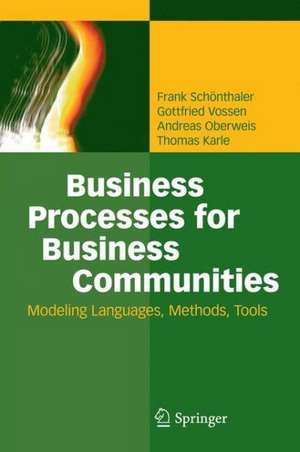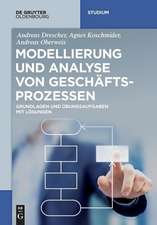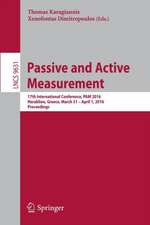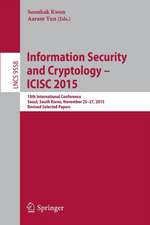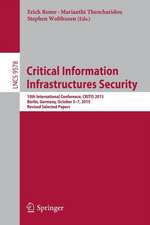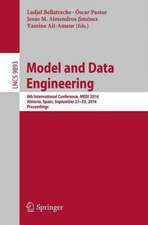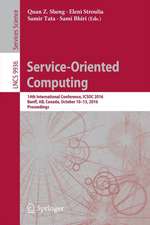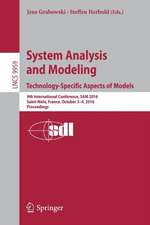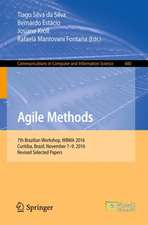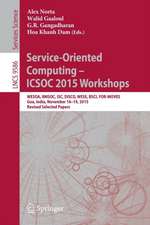Business Processes for Business Communities: Modeling Languages, Methods, Tools
Autor Frank Schönthaler, Gottfried Vossen, Andreas Oberweis, Thomas Karleen Limba Engleză Paperback – 13 apr 2014
| Toate formatele și edițiile | Preț | Express |
|---|---|---|
| Paperback (1) | 281.31 lei 39-44 zile | |
| Springer Berlin, Heidelberg – 13 apr 2014 | 281.31 lei 39-44 zile | |
| Hardback (1) | 334.05 lei 6-8 săpt. | |
| Springer Berlin, Heidelberg – 16 mar 2012 | 334.05 lei 6-8 săpt. |
Preț: 281.31 lei
Preț vechi: 351.63 lei
-20% Nou
Puncte Express: 422
Preț estimativ în valută:
53.83€ • 57.56$ • 44.88£
53.83€ • 57.56$ • 44.88£
Carte tipărită la comandă
Livrare economică 14-19 aprilie
Preluare comenzi: 021 569.72.76
Specificații
ISBN-13: 9783642430527
ISBN-10: 364243052X
Pagini: 204
Ilustrații: XII, 189 p. 99 illus.
Dimensiuni: 155 x 235 x 11 mm
Greutate: 0.29 kg
Ediția:2012
Editura: Springer Berlin, Heidelberg
Colecția Springer
Locul publicării:Berlin, Heidelberg, Germany
ISBN-10: 364243052X
Pagini: 204
Ilustrații: XII, 189 p. 99 illus.
Dimensiuni: 155 x 235 x 11 mm
Greutate: 0.29 kg
Ediția:2012
Editura: Springer Berlin, Heidelberg
Colecția Springer
Locul publicării:Berlin, Heidelberg, Germany
Public țintă
Professional/practitionerCuprins
Introduction.- Practical Introduction to Business Process Engineering.- Concepts and Modeling Languages.- The Horus Method.- Areas of Application.- The Future of Business Engineering.- Bibliography.
Notă biografică
Frank Schönthaler is managing partner and CEO of the PROMATIS group. He is responsible for corporate and product strategies and manages the core operating business. As Executive Consultant, he advises international clients in strategy development and business reengineering. He is the leader of the Business solutions community at the DOAG - German Oracle users group.
Gottfried Vossen is a Professor of Computer Science in the Department of Information Systems at the University of Münster in Germany. Since 2004 he has been a Director of the European Research Center for Information Systems (ERCIS) in Muenster. His research interests include conceptual as well as application-oriented problems concerning databases, information systems, process modeling, and various forms of Web 2.0 applications as well as implications.
Andreas Oberweis is Professor for Applied Informatics at the Karlsruhe Institute of Technology (KIT). Since 2004 he is also Director at the Research Center for Information Technology (FZI) Karlsruhe. He received a Doctoral Degree in Informatics from University of Mannheim in 1990 and a Habilitation Degree in Applied Informatics from University of Karlsruhe in 1995. From 1995 to 2003 he was Professor for Information Systems Development at Goethe University in Frankfurt/Main. His research interests are in the field of business process engineering and information systems development.
Thomas Karle manages the business applications division at PROMATIS software GmbH. In this role, he is responsible for international customer projects implementing Oracle Applications and Oracle BPM solutions. He also advises large and medium-sized enterprises in the creation of comprehensive business process management systems and in IT strategy and architecture issues. Thomas Karle manages the business applications division at PROMATIS software GmbH. In this role, he is responsible for international customer projects implementing OracleApplications and Oracle BPM solutions. He also advises large and medium-sized enterprises in the creation of comprehensive business process management systems and in IT strategy and architecture issues.
Gottfried Vossen is a Professor of Computer Science in the Department of Information Systems at the University of Münster in Germany. Since 2004 he has been a Director of the European Research Center for Information Systems (ERCIS) in Muenster. His research interests include conceptual as well as application-oriented problems concerning databases, information systems, process modeling, and various forms of Web 2.0 applications as well as implications.
Andreas Oberweis is Professor for Applied Informatics at the Karlsruhe Institute of Technology (KIT). Since 2004 he is also Director at the Research Center for Information Technology (FZI) Karlsruhe. He received a Doctoral Degree in Informatics from University of Mannheim in 1990 and a Habilitation Degree in Applied Informatics from University of Karlsruhe in 1995. From 1995 to 2003 he was Professor for Information Systems Development at Goethe University in Frankfurt/Main. His research interests are in the field of business process engineering and information systems development.
Thomas Karle manages the business applications division at PROMATIS software GmbH. In this role, he is responsible for international customer projects implementing Oracle Applications and Oracle BPM solutions. He also advises large and medium-sized enterprises in the creation of comprehensive business process management systems and in IT strategy and architecture issues. Thomas Karle manages the business applications division at PROMATIS software GmbH. In this role, he is responsible for international customer projects implementing OracleApplications and Oracle BPM solutions. He also advises large and medium-sized enterprises in the creation of comprehensive business process management systems and in IT strategy and architecture issues.
Textul de pe ultima copertă
After a brief introduction to the topic of business process modeling, the book offers a quick-start into model-based business process engineering. After that, the foundations of the modeling languages used are conveyed. Meaningful examples are in the foreground - each of the underlying formalisms is treated only as far as needed. Next the Horus Method is described in detail. The book defines a sequence of activities which finally leads to the creation of a complete business process model. The Horus Method, incidentally, is not bound to the use of the Horus software tools. It can be used with other tools or, if necessary, be used even without tool support. Important application fields of business process engineering are described, where the spectrum ranges from business process reengineering to the development and implementation of information systems. The book concludes with an outlook on the future of business process engineering and highlights current research activities in the area.
Caracteristici
Unique and practically proven method for business process engineering Support through a tool that can be freely downloaded Formally precise foundations based on latest research results Simulation offers a preview of business process performance
